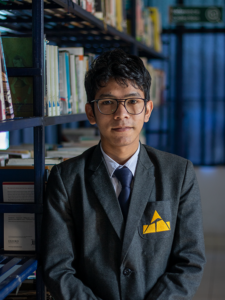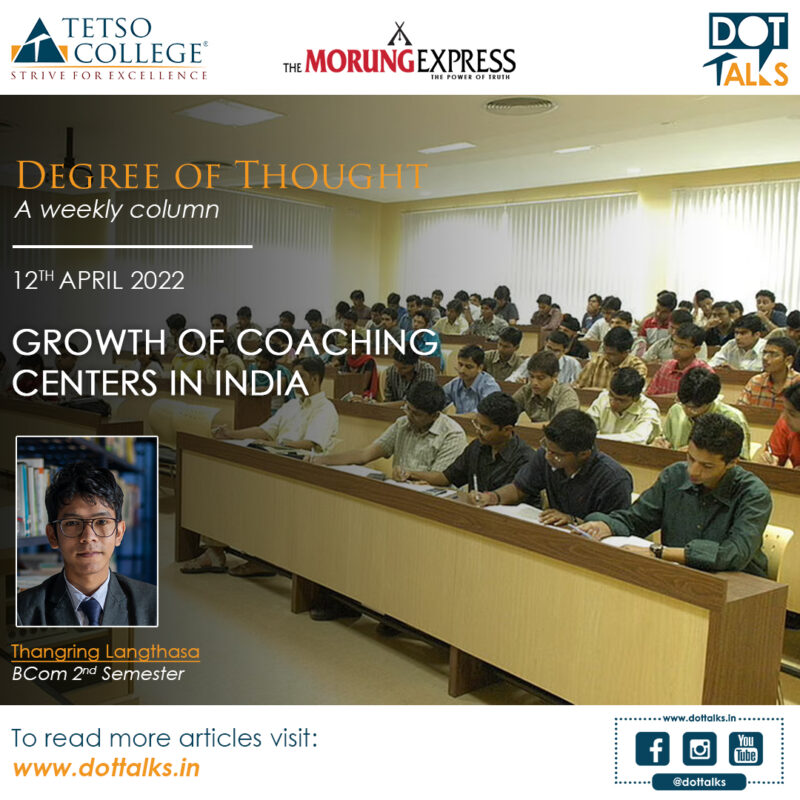 Coaching is the act of giving special classes in sports, in a school subject or a work-related activity, especially to one person or a small group. Coaching institutions are the places where this activity is organised. The share of the education sector in India was 91.7 Billion USD in 2018, which had risen to 117 Billion USD in 2020 and continues to expand. The coaching industry alone contributes approximately 3.5 billion USD to this, which is huge considering the fact that there are various types of educational institutes in the country including schools, colleges etc.
Coaching is the act of giving special classes in sports, in a school subject or a work-related activity, especially to one person or a small group. Coaching institutions are the places where this activity is organised. The share of the education sector in India was 91.7 Billion USD in 2018, which had risen to 117 Billion USD in 2020 and continues to expand. The coaching industry alone contributes approximately 3.5 billion USD to this, which is huge considering the fact that there are various types of educational institutes in the country including schools, colleges etc.
Growth of Coaching Centers in India
Coaching refers to an act of providing special classes in sports, in school subjects or any other work related activities, especially to a person or a small group of people. Coaching center is a term used for private institutions in coaching centers where students are provided special classes which help them to prepare for appearing in any kind of examination. Most of the students prefer to join coaching centers to prepare for entrance examinations in colleges and universities. Coaching provides a variety of topics like sports, education, etc. and one can choose according to their preference. Coaching centers are quite famous in India as compared to developed countries because they provide better quality of education .
The Indian education system is rapidly growing because of the competition among the students for the seat in elite colleges like AIIMS and IIT. The share of the education sector in India was 91.7 billion USB in the year 2018 which increased to 117 billion USB in the year 2020 and still continues to expand. The coaching Institute alone contributes about 3.5 billion USB which is huge considering the existence of various types of education including school and colleges.
Most of the parents understand the importance of coaching in their children’s future. They feel that it helps their child to understand and improve their knowledge which is not possible through school alone. The coaching industry is witnessing a massive expansion in the present time because of the increase in the level of competition among the students to achieve their goal. Lakhs of students happily cut down their living costs to pay coaching Institutes large fees with the common aim to get an admission to the most prestigious colleges or universities like All India Institute of Medical Science (AIIMS), Birla Institute of Technology Science(BITS) , Christian Medical College(CMC), and several other institutions. If we look at the competition for the seat in IIT-JEE more than 200000 students show up for their entrance exam but since only 10000 thousand seats are available only few students are selected and more than 770000 students take the MEET exam for an insignificant 2140 seats, despite the miserable proportion of students in those engineering or medical Institutes. As we can see that the total number of candidates appearing for JEE-IIT or NEET goes in lakhs and most of the students opt for coaching in some of the well known coaching brands like Aakash, FIITJEE and many other centers. Coaching classes are seen as the stepping stone for the students who are appearing for these exams. The craze of coaching institutes is also extended to post graduate students like MBA in India. Statistics and trends suggest that coaching will continue to flourish in the coming times as well.
As per the report from IBEF, India is the second largest market for E-education after the USA, as digitalisation is growing and reaching every corner of the country. The E-learning sector was expected to reach US$1.96 million by 2021 with around 9.5 million users. Thus the coaching industry is projected to grow in future as well though it is limited only to bigger cities as of now. The greater part of the classes are running in bigger cities as of now in metro cities like New Delhi, Mumbai, Kolkata, Bangalore and Chennai which are favoured for common administrative Law and Charter Accountants.
It has also been noticed that a significant number of the best educators have found employment elsewhere and taken up private training. Private mentors charge anything between INR 500 to INR 4000 every hour for each student depending upon the cities and the subject while multiple educational classes cost between INR 1000 to INR 6000 every month from a student. Thus there is a huge earning potential for private tutors. At the same time these tutors are the best in their work which is beneficial for the growth of the students as well as the institution.
The reason for the growth of coaching centers in India is the growing number of the population studying in school. According to IBEF, India currently has 250 million students who are going to school and the competition among these students helps the coaching centers to grow and expand and since most of the students speak English or Hindi, it becomes possible to easily deliver educational products for the students besides the huge number of different languages within India. The education market in India is expected to amount to 225 billion USD by the year 2025. Ed. Tech market in India is also projected to reach 10.4 billion USD by 2025.
India’s coaching Institutes have an incredible opportunity to grow, given the fact that around 580 million of the country’s population lies in the age group between 5-24 years. And since about 580 million people are around the age group of 5 – 24, the educational sector in general and coaching institutes are getting a lot of opportunities to grow and expand.
India has more than 250 million school going understudies which is more than the entire population of several nations. The continuous development in technology helps in the growth and expansion of coaching centers.
Degree of Thought is a weekly community column initiated by Tetso College in partnership with The Morung Express. Degree of Thought will delve into the social, cultural, political and educational issues around us. The views expressed here do not reflect the opinion of the institution. Tetso College is a NAAC Accredited UGC recognised Commerce and Arts College. The editors are Dr Hewasa Lorin, Dr. Aniruddha Babar, Aienla A, Rinsit B Sareo, Meren Lemtur and Kvulo Lorin.
For feedback or comments please email: dot@tetsocollege.org

